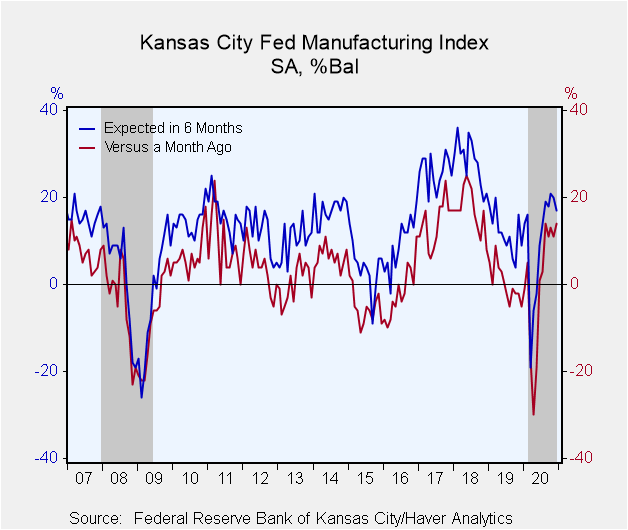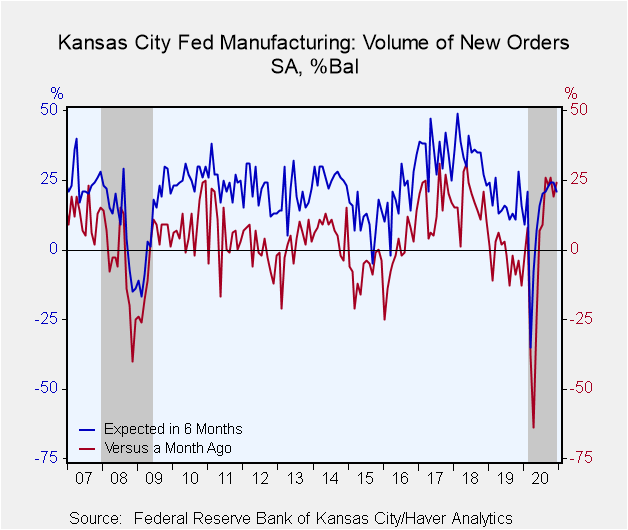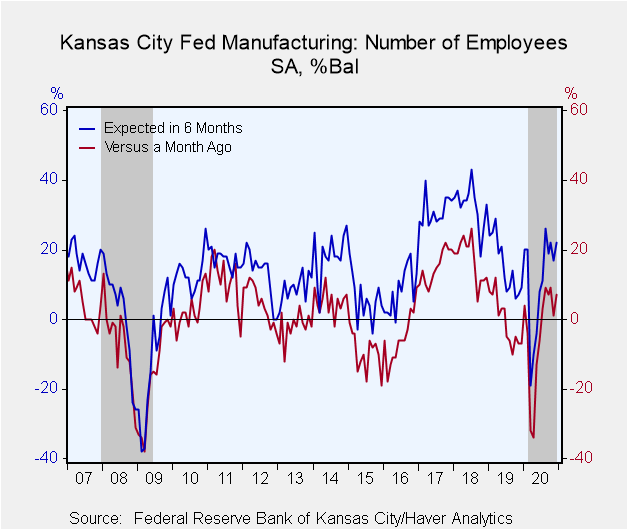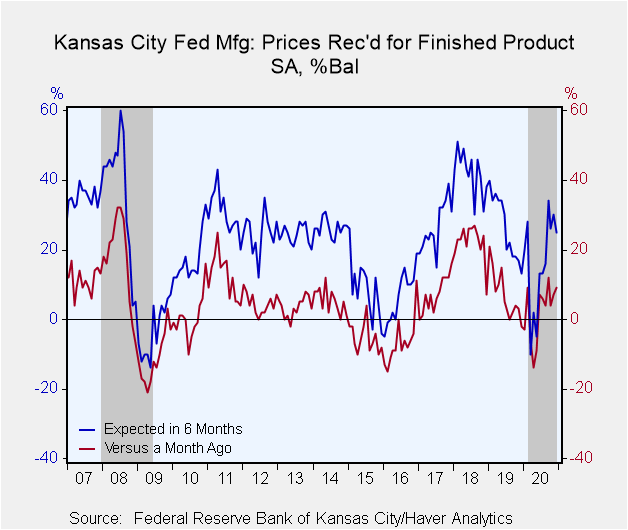 Global| Dec 17 2020
Global| Dec 17 2020Manufacturing Activity in Kansas City Fed District Improves During December
by:Tom Moeller
|in:Economy in Brief
Summary
• Growth continued at quickest rate in four months. • New orders and employment improved. • Expectations for six months ahead deteriorated. The Federal Reserve Bank of Kansas City reported that its manufacturing sector business [...]
• Growth continued at quickest rate in four months.
• New orders and employment improved.
• Expectations for six months ahead deteriorated.
The Federal Reserve Bank of Kansas City reported that its manufacturing sector business activity index rose to 14 in December from 11 in November. The headline figure remained well above the all-time low of -30 posted in April and equaled the highest level since November 2018.
The ISM-Adjusted Index (NSA) slipped to 53.0 in December from 53.9 in November, but remained well above the critical level of 50 that separates expansion from contraction. It also remained well above the low of 37.6 in April.
Improvement in the current conditions measures was led by delivery times which surged to an eight-month high. The new orders measure rebounded to 24 from 19, after having moved sideways since August. The employment measure also rose along with shipments & inventories. The production measure fell, however, to the lowest level since July.
On the inflation front, the prices received index for finished products rebounded in December to 9 after having fallen to 4 in October. These remain above the deflationary readings registered earlier this year. The raw materials index surged to 53, the highest reading since May 2011.
The expectations-in-six months composite reading declined to 17 in December, the lowest level since July. It remained up sharply, however, from -19 in March. Expected new orders, shipments and production fell while the employment measure.
Expectations for prices received fell to 25 in December, its lowest level in four months. Expectations for raw materials prices eased to 45 this month, down from 55 in October. The figure remains up sharply from its negative reading nine months earlier.
The composite index is an average of the production, new orders, employment, supplier delivery time and raw materials inventory indexes. The diffusion indexes are calculated as the percentage of total respondents reporting increases minus the percentage reporting declines. The November survey was conducted during the six-day period from November 10-16, 2020 and included 109 responses from plants in Colorado, Kansas, Nebraska, Oklahoma, Wyoming, northern New Mexico and western Missouri. Data for the Kansas City Fed Survey can be found in Haver's SURVEYS database.
| Kansas City Federal Reserve Manufacturing Survey (SA) | Dec | Nov | Oct | Dec'19 | 2020 | 2019 | 2018 |
|---|---|---|---|---|---|---|---|
| Conditions Versus One Month Ago (% Balance) | 14 | 11 | 13 | -5 | 0 | 0 | 17 |
| ISM-Adjusted Composite Index (NSA) | 53.0 | 53.9 | 56.2 | 43.4 | 50.1 | 50.0 | 58.9 |
| New Orders Volume | 24 | 19 | 26 | -13 | 1 | -3 | 17 |
| Number of Employees | 7 | 1 | 9 | -7 | -4 | -1 | 17 |
| Production | 12 | 20 | -3 | -2 | 0 | 2 | 19 |
| Prices Received for Finished Product | 9 | 7 | 4 | -2 | 2 | 7 | 22 |
| Expected Conditions in Six Months | 17 | 20 | 21 | 9 | 10 | 12 | 28 |
| New Orders Volume | 21 | 24 | 24 | 16 | 12 | 17 | 35 |
| Number of Employees | 22 | 17 | 22 | 9 | 11 | 15 | 33 |
| Production | 20 | 31 | 31 | 14 | 14 | 19 | 40 |
| Prices Received for Finished Product | 25 | 30 | 26 | 13 | 16 | 26 | 42 |
Tom Moeller
AuthorMore in Author Profile »Prior to joining Haver Analytics in 2000, Mr. Moeller worked as the Economist at Chancellor Capital Management from 1985 to 1999. There, he developed comprehensive economic forecasts and interpreted economic data for equity and fixed income portfolio managers. Also at Chancellor, Mr. Moeller worked as an equity analyst and was responsible for researching and rating companies in the economically sensitive automobile and housing industries for investment in Chancellor’s equity portfolio. Prior to joining Chancellor, Mr. Moeller was an Economist at Citibank from 1979 to 1984. He also analyzed pricing behavior in the metals industry for the Council on Wage and Price Stability in Washington, D.C. In 1999, Mr. Moeller received the award for most accurate forecast from the Forecasters' Club of New York. From 1990 to 1992 he was President of the New York Association for Business Economists. Mr. Moeller earned an M.B.A. in Finance from Fordham University, where he graduated in 1987. He holds a Bachelor of Arts in Economics from George Washington University.










